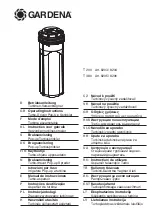
A
u
d
i
o
T
o
o
l
S
e
t
3
.
0
Functionality in Version 3.0 and Beyond
Starting with version 3.0, every time either an
AudioBox 2
instance is touched or inserted or
Audio Array 2
's
“Configuration Array...” dialog is opened, the Library file is read and checked using the following hierarchy:
First:
"User" Library in the “User” folder
Second:
"Sample" Library in the Application folder
Third:
"Old” (version 1) Library
The tools will stop looking with the “highest-priority” Library. In addition to adding or deleting speakers or
bumpers, the Library file is only re-written (or, copied) if certain errors are found and need to be fixed. Any Library
“writing” is done to the “User” folder. Assuming no elements are being added or deleted and the “sample” Library
doesn't contain the checked-for errors and it is the highest-priority Library found, the "User" file is never written.
The one exception to this error checking and fixing has to do with weight. When the Library is simply read (to
populate the various Pop-Up menus), weight units are not considered. When different speakers or bumpers are
selected, though, this these units ARE checked. If weight unit information is missing, you are asked what unit was
intended when the selected element was initially added to the Library and the Library file is written (or, created for
the first time) to your “User” folder. If the correct lb/kg weight system is found for the selected element, no Library
writing is done.
Sharing Library Files
To copy your
Audio ToolSet 2
Library from one computer to another, simply find "AudioToolSetData.xml" on the
“source” computer and copy the file to the same place on the “destination” computer (more-than-likely, the “User”
folder).
Two warnings to heed:
1) If there is ANY question about truly wanting to over-write any Library information on the “destination
computer, make sure you save a copy of that file in a safe place.
2) While all versions of the
Audio ToolSet 2
tools will be able to read any version of "AudioToolSetData.xml,"
older versions don't recognize the much of the current data and if you “round-trip” the file, that information will
be lost.
p
a
g
e
1
9
o
f
1
9

































